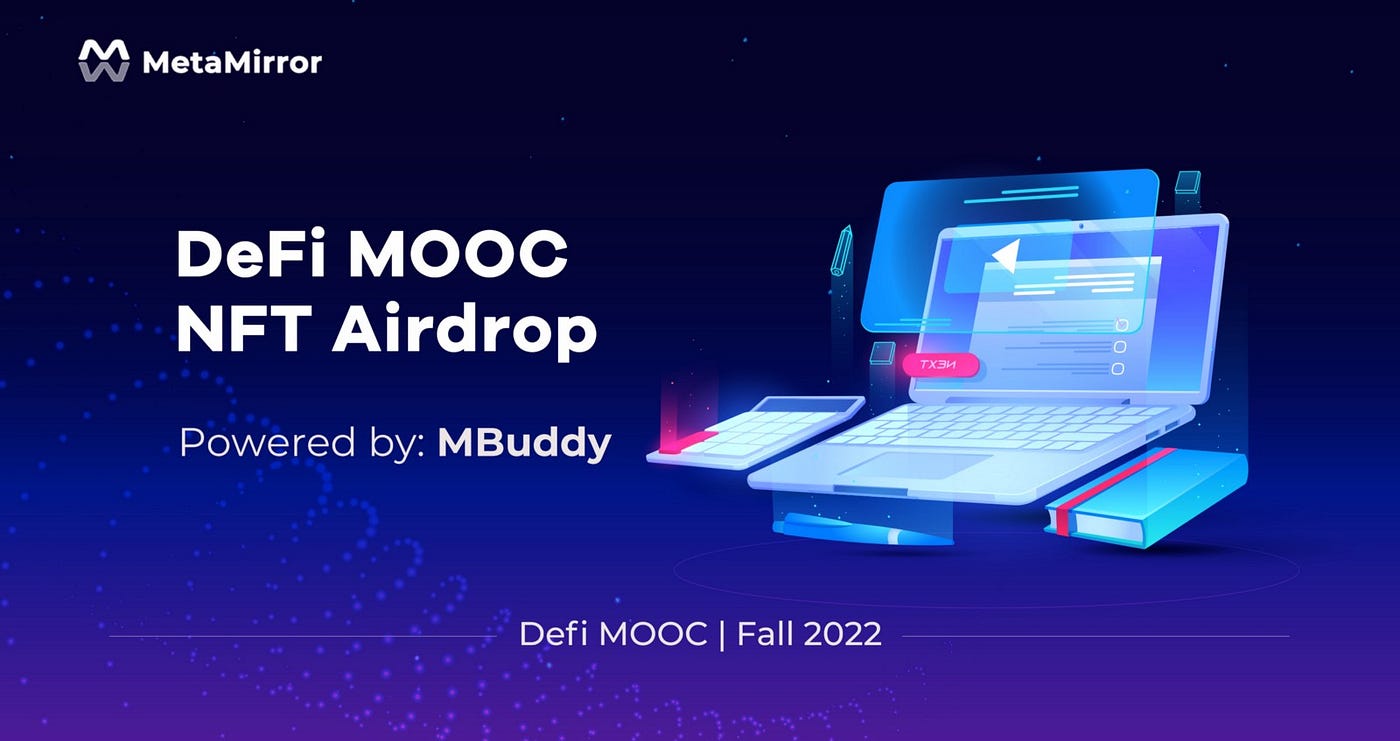First of its kind privacy-preserving NFTs used as a certificate for massive open online course | by MetaMirror | MetaMirror | August 2022

In a first-of-its-kind initiative, NFTs and tokens will be awarded as course credentials from the DeFi MOOC. However, these NFTs go beyond the usual features seen today, as these will offer privacy-protecting functionality. Using the Oasis Platform’s secure data management API, called Parcel, course credentials can be verified while user information is kept private.
The first DeFi MOOC – a massive open online course on DeFi – was held in autumn 2021 by Professor Dawn Song, Christine Parlor (University of California, Berkeley), Dan Boneh (Stanford), Andrew Miller (University of Illinois Urbana-Champaign), and Arthur Gervais (Imperial College London).
Since then, the course has attracted many thousands of students participating from over 30 countries worldwide and currently has more than 180,000 lecture views. As a way to commemorate the completion of this course, each eligible student will now be awarded a DeFi MOOC 2021 NFT.
Given the desire to have both a tradable NFT and a non-tradable certificate, the DeFi MOOC team has issued a DeFi MOOC NFT and a Soulbound MBuddy Identity badge that certifies students’ course achievements. Soulbound tokens are another type of NFT that are permanent and non-transferable.
The DeFi MOOC will use a privacy-enhancing solution powered by MetaMirror on the Oasis Network – the leading scalable and privacy-enabled layer-1 blockchain network – to provide verifiable certification while protecting user data and privacy.
In this post, we will cover the motivations and future of this exciting technology.
Essentially, the DeFi MOOC will use students’ MBuddy identity to distribute class NFTs. This will:
- Provide a non-transferable ID badge that acts as course completion certificate, which can be reused on other occasions.
- Preserve the privacy of the NFT recipient as students do not need to expose their wallet addresses to course staff or other unnecessary parties
- Be usable in the MBuddy platform as input for user-defined identity generation to create more comprehensive identities.
Each eligible student will receive both a tradable NFT and a non-tradable badge. There will be four levels of NFTs and the NFTs will be distributed according to the rules on the MOOC website (https://defi-learning.org/f21).
Most people understand that blockchain has basic computational functionality, often at the sacrifice of user privacy. Using Oasis’ Parcel – a data governance SDK primarily designed to use sensitive data while keeping it secure and private – the DeFi MOOC is able to implement a non-transferable certificate while protecting the identity of The NFT holder. This certificate proves that the course has been completed, while keeping the identity of the associated wallet address secret.
Package has been used in NFT technology at Oasis in the form of confidential NFTs which in turn represent additional functionality for these blockchain assets. Confidential NFTs work just like regular NFTs, but also provide access to completely private data which, at Parcel’s full permission and data layer, can be put to work in a number of different ways.
The resulting non-negotiable token becomes a verifiable credential that can then be shared with others by incorporating it into their MBuddy Web3 identity, a Web 3.0+ identity infrastructure that bridges vast Web 2.0 data assets into blockchains.
As a Web 3.0 identity infrastructure, MBuddy returns data control and data rights to individual owners. Users initiate data sharing under full stack privacy for personal benefit. The use of NFTs in Web3 identity is a perfect fit and aligns Oasis with its focus on data protection and what MBuddy wants to achieve.
1) Define the identity mark
Since MBuddy Identity generation is performed with full privacy preservation, it is capable of ingesting data from all sources and protecting private information.
This allows the brand definer to distribute the identity mark without accessing the recipients’ wallet addresses. In particular, the token may be distributed based on, but not limited to, email addresses, Web 2.0 service accounts, and KYC identification data.
In the DeFi MOOC, this token is distributed based on the student’s UUID – a random one-time number.
- The course staff first defines an identity mark called Class certificate autumn 2021.
- The algorithm determines the class level of a user based on a unique credential UUID submitted by the student.
- The algorithm is then stored and calculated in a privacy-preserving storage and calculation environment of the Oasis Platform’s Parcel.
2) Distribution of the identity mark
The students claim theirs Class certificate autumn 2021 by generating their MBuddy identity. This is a user-controlled Web3.0 identity where data is stored in the user’s own Package account as personal data resources to serve as input for identity generation.
The Class certificate autumn 2021 the identity badge requires two verifiable data inputs: wallet address and an identification ID. The user’s credential ID is fed into the algorithm defined in the last section to determine which of the four grades the student will receive.
3) Application of identity mark in NFT allocation
The course staff and the student then have access to the data Class certificate autumn 2021 the identity mark and can use it. That is, the course staff has access to the exact information needed to perform an NFT airdrop: the wallet address and the class level. After generating the identity mark, the MOOC class NFT will be airdropped within
4) Use of certificate in extended use cases
The Class certificate autumn 2021 is a user-autonomous MBuddy Identity attribute that is not generally available to the general public. Only the badge owner – the student himself – and the space owner have access to read the value of this attribute.
Since the MBuddy owner is in control of the use of their identity, under extended use cases, the badge holder can grant access to a third party based on the badge holder’s needs.


